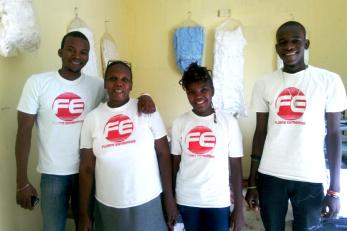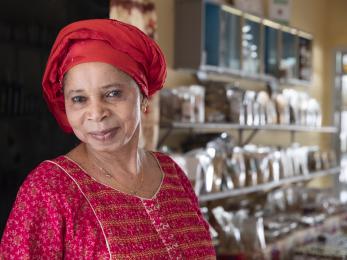Growing businesses in Haiti's toughest neighborhoods

Five years after the island nation’s devastating earthquake, owning a business is still a struggle in Haiti’s informal economy.
Jobs at large businesses, along with steady salaries, are almost impossible to find, so most people man stalls along the streets of Port-au-Prince or own small businesses offering services or goods to neighbors and people passing by.
The tiny businesses that are most common in Haiti provide a minimal survival wage, but they are so small that an entire business can be easily derailed by one unexpected expense or setback.
Our programs in and around the country’s capital are working to boost local entrepreneurs to the next level so they can earn more income and have a better measure of security.
With a little help from a small loan, Haitians can expand their businesses so they are less vulnerable to the natural ups and downs that come with being self-employed. Fifty-year-old seamstress Denis Florye participated in one of our programs and has seen her hard work and determination pay off.
In Carrefour-Feuilles, one of the poorest suburbs of Port-au-Prince, Denis owns and manages “Florye Shop,” where she specializes in professional upholstery. A mother of four, Denis is just one of the 88 entrepreneurs that the LAMIKA program — with funding from the American Red Cross and in partnership with Entrepreneurs du Monde — has helped since November, and her business is thriving.
After 2010’s earthquake, Denis’ small shop was devastated. She reopened the store, struggling to operate out of a makeshift shed. "The workshop was operating, but at a reduced pace because of lack of funding,” she says.
Knowing that she needed help to fully recover, Denis began searching for funding opportunities to strengthen her business. But she found nothing. “It is not easy for small entrepreneurs like me to find affordable credit in existing financial institutions,” she tells us.
Even with 10 years of experience under her belt, Denis could not find a loan. Her story is not unusual in Haiti — any business owners are unable to access any form of credit because interest rates are too high and they don’t have the required collateral.
That’s where Mercy Corps steps in — we know that access to credit can make all the difference to an ambitious entrepreneur in a challenging place like Haiti. When Denis heard about the LAMIKA program, she quickly signed up and completed all the necessary steps to get a business loan.
With support and guidance, Denis put together a detailed business plan for the expansion of her business. After her plan was reviewed, she received a loan of $5,700 to turn “Florye Shop” into “Florye Enterprise.”
“This loan allowed me to take my business to the next level.” With the money in hand, Denis was able to rent an additional workspace and purchase a generator, new sewing machines, and a new supply of fabric.
Having expanded her company’s production capacity, she can now meet the demand of her customers while providing better working conditions for her employees.
As part of the new program, Denis attends business management training and receives technical support and coaching during one-on-one mentor sessions. “All this support keeps me motivated and strengthens my abilities and those of my business,” she says.
Today, after just a few months, “Florye Enterprise” is a true success. Denis’ shop regularly fills orders for customers from Port-au-Prince and other areas across Haiti.
For Denis and her four dedicated employees, the LAMIKA program helped transform their business. Once just a small shop that had barely recovered after the earthquake, Denis’ tiny business is now her very own enterprise.


